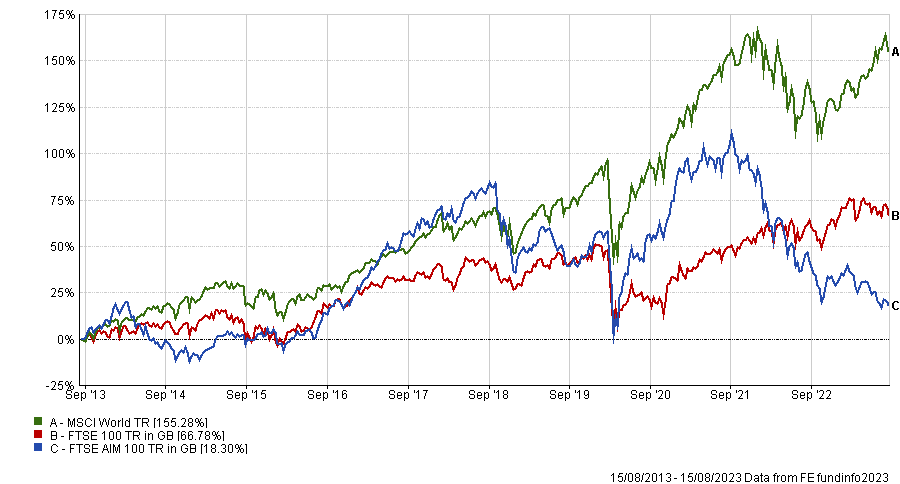One way investors can plan a future for their families with as little tax incurred as possible is to invest in a portfolio of AIM stocks that count as eligible for 40% inheritance tax (IHT) relief.
Many AIM companies (though not all) are free from inheritance tax if held for two years or more, benefiting from business property relief rules that encourage investment in smaller companies.
The AIM ISA was introduced 10 years ago, allowing investors to shield their money from capital gains and income tax as well as inheritance tax.
But using this strategy has been far from a sure bet, according to Laith Khalaf, head of investment analysis at AJ Bell.
Over the 10 years since AIM shares were eligible for inclusion in a stocks and shares ISA, the AIM 100 has made a paltry 18.3%, compared with a 66.8% gain for the FTSE 100 large-cap index and 155.3% return from the MSCI World index of global companies.
Performance of indices over 10yrs

Source: FE Analytics
“Returns from AIM over the past decade have been Hollywood and bust, reaching a crescendo in 2021 and then dramatically falling back again,” Khalaf said.
The AJ Bell head of investment analysis looked at returns both pre and post inheritance tax, where the figures improved, but still fell short.
On £100,000 invested in August 2013, the AIM 100 would be worth £120,757 after IHT – still some £50,000 short of the MSCI World’s £170,803 – although it is ahead of both the FTSE All Share and FTSE Small Cap (ex investment trusts) indices over this time.
As such, early AIM ISA investors would have been better off investing in a global fund and taking the IHT hit, rather than buying AIM shares.
“This is of course plain to see only with the benefit of 20:20 hindsight, but it should give investors pause for thought when constructing their portfolio, especially when considering the additional risks of investing in AIM,” said Khalaf.
There have been pockets when the strategy has worked however, with the high point in the market in August 2021. In fact, although the IHT benefit has now been mitigated by poor performance, holding an AIM portfolio on death between 2015 and 2022 was more profitable than a portfolio of global stocks.
“Of course, death and taxes may be certain, but their timing is not, and AIM investors can’t simply choose to cash in their IHT benefit at an opportune moment when the market is flying high,” he said.
As such, while the tax relief has been valuable at times, there is no guarantee that it will be when it is to be relied upon.
Some shares have performed better than others. The share price of AB Dynamics is up 1,570% over the past decade, YouGov has increased by 1,330% and Jet2 has risen 322%, according to AJ Bell.
“But at the other end of proceedings there are companies which have lost investors most, if not all of their money,” Khalaf said.
“Using AIM stocks to mitigate inheritance tax is a strategy that needs to be handled with care, whether it’s used inside or outside an ISA.”
Another issue is that the inheritance tax rules say AIM companies qualify provided they don’t mainly deal in shares or land, but there is no definitive list of eligible companies.
“Investors therefore face Schrodinger’s tax bill on death. When the executors open the box containing the AIM portfolio, there may or may not be a hefty inheritance tax charge to pay,” said Khalaf.
IHT relief can also be withdrawn from AIM stocks, which would largely remove any benefit to owning the risky assets. They have lagged considerably in performance terms and could cause the market to tank if money that was invested for this relief is removed for better returns elsewhere.
“There’s no suggestion at the moment that politicians of any stripe are considering this, but investors should be alive to this possibility, however remote it may seem,” he noted.
Overall, Khalaf said experienced investors may be willing to take on the risks, but need to “approach with a line and rod rather than a trawling net”.
AIM funds are an option, but do not qualify for IHT relief as it is only applicable to direct investment in the companies. Some wealth managers offer AIM portfolios which are professionally managed but where the stocks are held in the investor’s name. However, this can be more costly, with charges of between 1.5% and 2% per year further eating into any returns.




